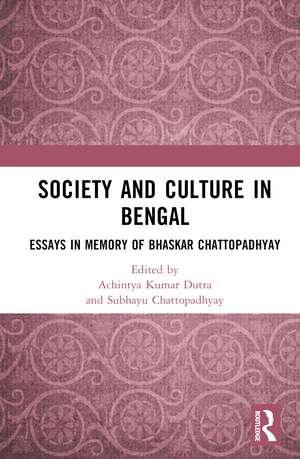Society and Culture in Bengal: Essays in Memory of Bhaskar Chattopadhyay
Editat de Achintya Kumar Dutta, Subhayu Chattopadhyayen Limba Engleză Hardback – 30 oct 2024
The volume will be of great interest to scholars and researchers of Indian history and culture and South Asian studies.
Preț: 1003.30 lei
Preț vechi: 1223.53 lei
-18% Nou
Puncte Express: 1505
Preț estimativ în valută:
191.99€ • 205.29$ • 160.07£
191.99€ • 205.29$ • 160.07£
Carte tipărită la comandă
Livrare economică 17 aprilie-01 mai
Preluare comenzi: 021 569.72.76
Specificații
ISBN-13: 9781032522043
ISBN-10: 1032522046
Pagini: 258
Ilustrații: 14
Dimensiuni: 156 x 234 mm
Greutate: 0.54 kg
Ediția:1
Editura: Taylor & Francis
Colecția Routledge India
Locul publicării:Oxford, United Kingdom
ISBN-10: 1032522046
Pagini: 258
Ilustrații: 14
Dimensiuni: 156 x 234 mm
Greutate: 0.54 kg
Ediția:1
Editura: Taylor & Francis
Colecția Routledge India
Locul publicării:Oxford, United Kingdom
Public țintă
PostgraduateCuprins
Foreword. ‘Bhaskarda’ – Personal Reminiscences of a gentle teacher, scholar and soul. Introduction. Part I: Aspects of Society, Economy, and Religion of Pre-modern Bengal 1. Currency in Early Bengal 2. Archaeological Sites in a Constructed Landscape: Case Histories from Rarh Bengal 3. Perspectives of Historical Biographies in Early India 4. The act of Dāna or Deyadhamma: Patronage to Buddhist monasteries in early Bengal (c.5th cent. CE to 13th cent. CE) 5. Confluence of Creativity and Spirituality: A Study of Some Arabic Inscriptions of the Bengal Sultanate 6. Challenges in Studying Social History of Medieval Bengal 7. Medical Literature from Early Medieval Bengal: Making of a Regional Tradition Part II: Exploring Life and Culture in Modern Bengal 8. Three Overlapping Frontiers in Early Modern Bengal: Religion, Agrarian, Imperial 9. The Cultural Dynamics of Rahr: Defiance and Decline. 10. Who Owns the Past? Contestation on Mahabodhi Temple 11. Patriotism and a Poet in the Colonial World: Rabindranath Tagore and Nationalism 12. Calcutta: The Emergence of a Science City (1784-1896) 13. ‘They’ Wanted to Live: Lens, the Witness 14. ‘For the Recovery of His Health:’ The East India Company and the Problem of Tropical Invalidism 15. Disease and Disruption in a Bengal District: Fever, Agriculture and Peasantry of Burdwan, 1863-1921
Notă biografică
Achintya Kumar Dutta is Professor of History, The University of Burdwan, and former post-doctoral Commonwealth Fellow at School of Oriental and African Studies, London (2002-03). He was a Visiting Researcher at the Brocher Foundation, Geneva, Switzerland (2022). His research interests include socio-economic history and history of science and medicine in modern India. His recent publications include Trauma in Public Health: Tuberculosis in Twentieth-century India (2018), Connecting Nations: Politico-cultural Mapping of India and Southeast Asia (co-edited, 2019), Dreadful Diseases in Colonial Bengal: Cholera, Malaria and Smallpox A Documentation, (co-edited, 2021), and Explorations in Colonial Bengal: Essays on Religion, Society and Culture (edited, 2023).
Subhayu Chattopadhyay is an Assistant Professor, Department of History, Visva-Bharati. His area of specialization is ‘History of Science and Technology in Colonial and Post-Colonial India’ and ‘Social and Cultural History of Colonial and Post-Colonial India’. He has co-edited a book titled Mapping the Path to Maturity: A Connected History of Bengal Bengal and North-East (New Delhi, 2018).
Subhayu Chattopadhyay is an Assistant Professor, Department of History, Visva-Bharati. His area of specialization is ‘History of Science and Technology in Colonial and Post-Colonial India’ and ‘Social and Cultural History of Colonial and Post-Colonial India’. He has co-edited a book titled Mapping the Path to Maturity: A Connected History of Bengal Bengal and North-East (New Delhi, 2018).
Descriere
This book examines the social and cultural history of Bengal through two major themes — the intellectual and cultural dimension, and the socio-economic changes from the ancient to the postcolonial.
